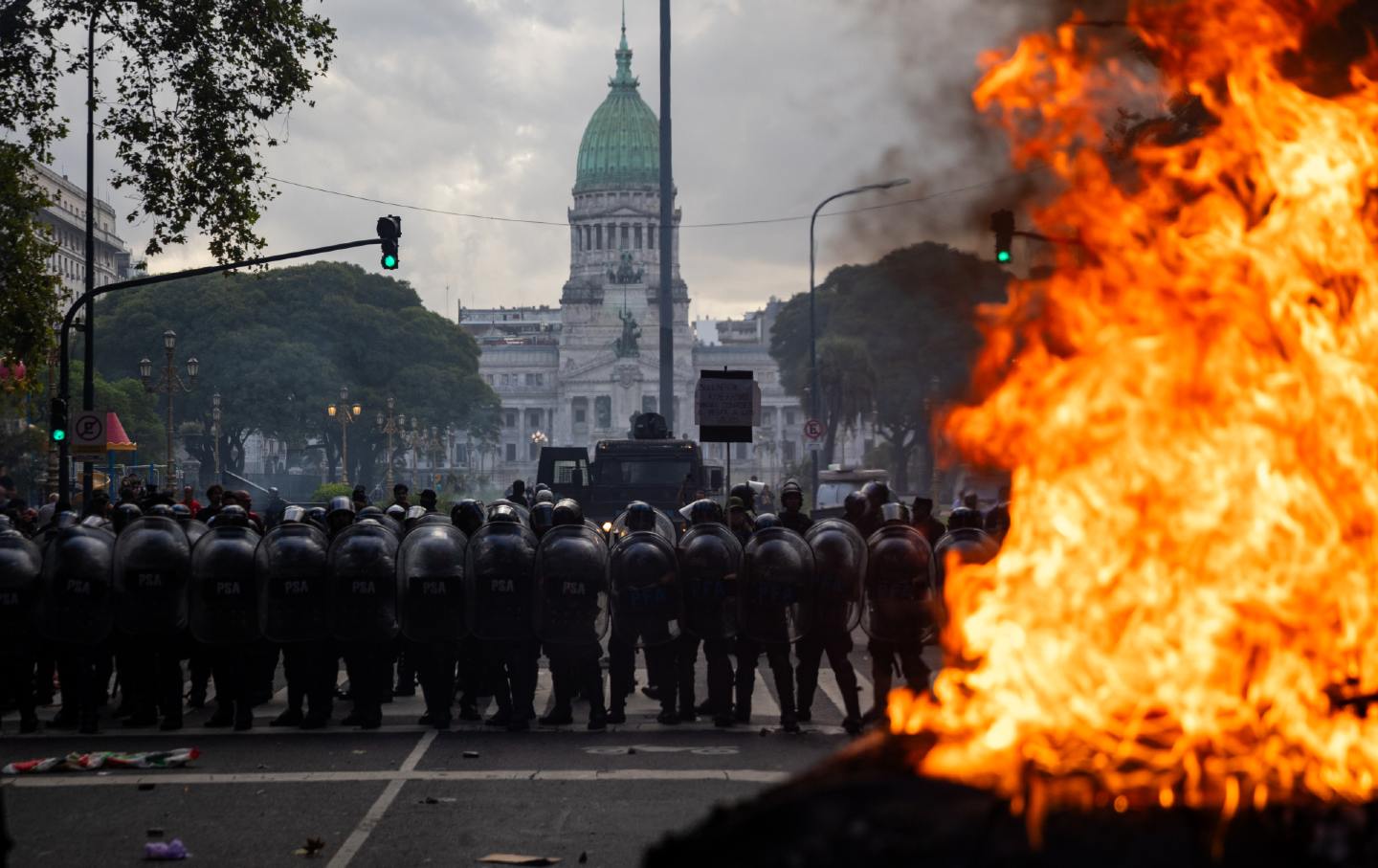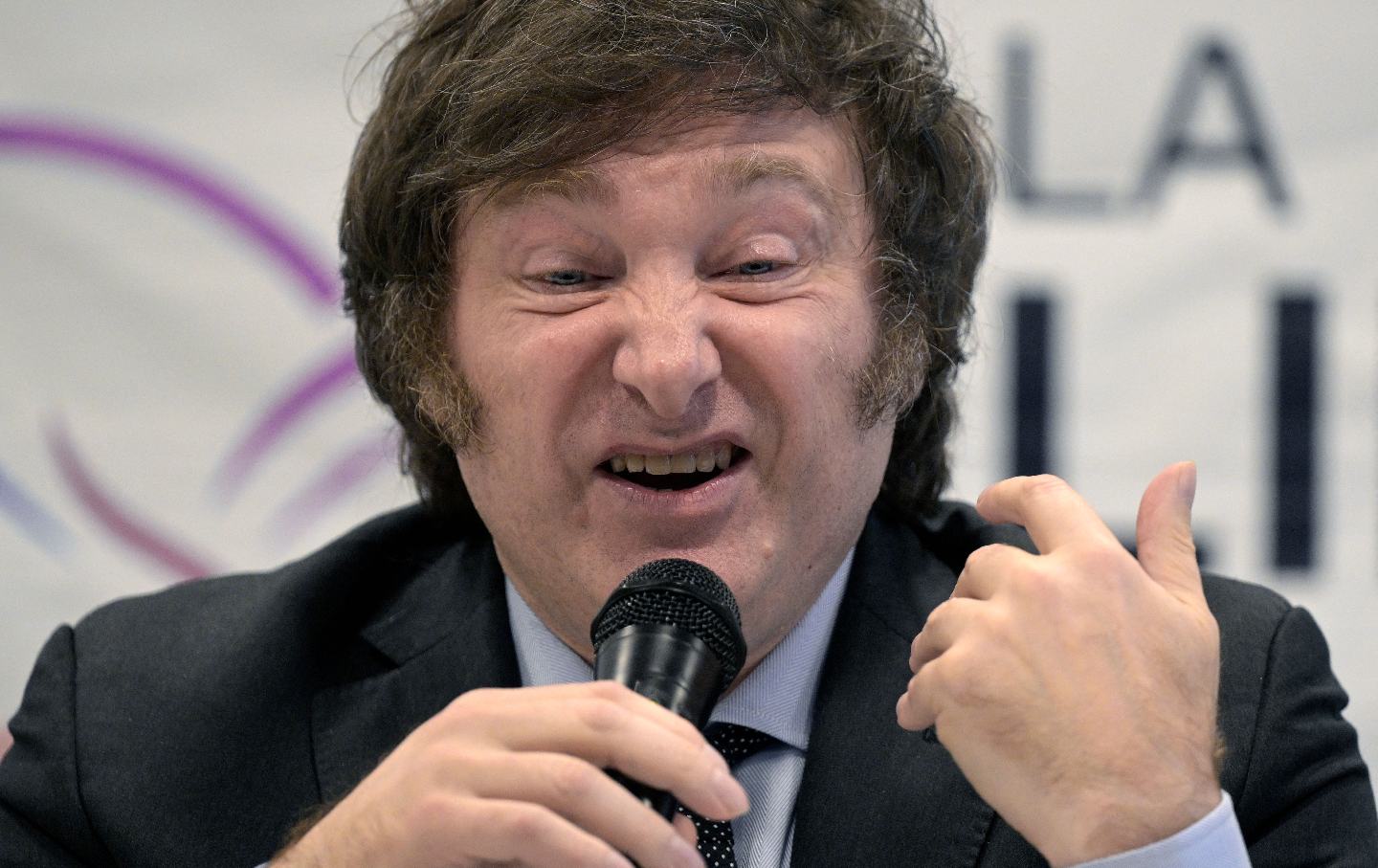The Post-Future Has Arrived in Argentina—and It Looks Remarkably Like the Past
Javier Milei’s right-wing government is racking up new debt with the IMF. It’s part of a vicious cycle the country seems unable to break.

Buenos Aires—The Basilica de San José de Flores didn’t appear in most guidebooks to Argentina prior to 2013. Located in a working-class neighborhood of Buenos Aires, its current structure was completed in 1883 by the Italian architects Emilio Lombardo and Benito Panuzzi, just off Plaza General Pueyrredón. Although its interior is ornate, with ubiquitous gold leaf, the church is a modest structure, with a small apse and sanctuary, and several dozen rows of well-worn pews stretching across its nave.
In the years since Jorge Mario Bergoglio became pope, however, the basilica has become a minor tourist attraction. It was here that Francis attended service during his infancy and adolescence, and here that he ultimately decided to dedicate his life to God.
On April 21, hundreds of Argentines packed the church for evening mass and to pay their respects to the newly departed pontiff. Inside, the vestibule was standing room only, and the air was thick with the smells of perfume, body odor, and the faint aroma of incense. The crowd was solemn but unified, holding each other’s hands (or in my case, a finger, while I clutched my notebook and phone) during the recitation of “Our Father.”
Outside the church, it was another story entirely. Shortly after the mass’s completion, Argentine Vice President Victoria Villarruel beat a hasty exit down the basilica’s steps with a security detail to loud and increasingly raucous calls of “traitor.” For an instant, it felt as though she might be physically assaulted. A separate brawl would erupt several minutes later, although by then the vice president was long gone.
“It’s a tragedy,” reflected Andrea Prado, a 52-year-old sociologist from Buenos Aires province, after the dust-up. “[In Francis], we’ve lost one of the last great humanists and advocates for the poor. Now the far right gets to cover up all the atrocities that it’s committing. This is the best thing that could have happened to [Argentine President Javier] Milei.”
Less than 18 months since the self-styled anarcho-capitalist took office, Argentina finds itself in a political, economic, and social torpor. Monthly inflation has fallen sharply, from 25.5 percent in January 2024 to 3.7 percent in March of this year; so has the poverty rate, from 52.9 percent in the first six months of 2024 to 38.9 percent at year’s end. Yet both figures are somewhat misleading. Inflation jumped in early 2024 after a series of tax cuts and unfunded spending measures from the outgoing Peronist government, and then skyrocketed, along with poverty, on the heels of an 18 percent currency devaluation in August 2024 and another 54 percent currency devaluation that Milei announced two days after assuming power. That has set his administration up to harvest some low-hanging fruit; a March report from the Institute of Socioeconomic Statistics and Trends in Córdoba province found that “social indicators continue to show no significant improvement.” Across the country, the most popular television series is an adaptation of H.G. Oesterheld and Francisco Solano López’s classic comic El Eternauta—a sci-fi survival saga set in a post-apocalyptic Buenos Aires.
Salaries and pensions have stabilized in dollar terms, but the former has failed to keep pace with inflation, while the latter has lagged well below the breadline. (Last September, the Argentine president used his veto power to nullify a pension increase.) At the same time, the government has taken to violently suppressing its retirees, who protest its draconian austerity measures each Wednesday in front of Congress. Now, after mandating a loan via executive order before a deal was even in place, Milei and Economy Minister Luis Caputo have taken on even more debt with the International Monetary Fund in the form of a $20 billion line of credit.
That the IMF is extending an economic lifeline to an outspoken Trump ally at the United States’ behest seems indisputable. More devastating for Argentina and liberal democracies more broadly is that few within a politically exhausted opposition can articulate any plausible alternative to this rigged game—one whose rules are being bent in real time to the cruelty and caprice of a fractious but empowered far-right international.
“Thinking about alternatives to this scenario is its own form of trap,” explained Itai Hagman, a congressman representing the city of Buenos Aires and an economic adviser to former Peronist presidential hopeful Juan Grabois. “Milei inherited a complicated macroeconomic and social situation, but it was his own decisions that have left him between a rock and a hard place. If it weren’t for the bloodletting at the beginning of 2024 or the record exchange rate appreciation and depletion of Central Bank reserves in the second half of the year to maintain the value of the peso, the government could have avoided falling into the clutches of the IMF, which is, by definition, a lender of last resort.”
On April 12, the IMF Executive Board formally approved an Extended Fund Facility arrangement with Argentina—the 23rd in the nation’s history—with an immediate disbursement of $12.3 billion. The loan, at least in theory, is meant to help address the country’s macroeconomic vulnerabilities, which include negative foreign currency reserves and inflation running at 56 percent annually, while opening the country to international markets in a “timely” fashion, per the IMF.
The following Monday, the Milei government lifted a majority of currency restrictions known locally as the cepo. These restrictions are used to protect reserves during periods of instability, but have served as an impediment to foreign investment, with many companies unwilling to navigate the country’s parallel exchange rates. In doing so, the administration has created a new floating scheme in which the dollar can be valued anywhere from 1000 to 1400 pesos.
“I don’t totally get why the IMF keeps lending money to Argentina,” Michael Paarlberg, an associate professor of political science at Virginia Commonwealth University and Bernie Sanders’s Latin America adviser during the 2020 Democratic primary, told The Nation. “I understand that it’s a major economy, and it would be bad if it went under. But it’s also the worst sovereign debtor in world history. The Fund is a little like Charlie Brown with the football.”
“This pattern keeps repeating itself,” he continued. “A conservative gets into office and loads the country up with unsustainable debt. Then the Peronists return to power and either default on the debt or renegotiate it.”
Just seven years earlier, during Trump’s first term, then–Argentine President Mauricio Macri secured a $57 billion loan from the IMF—the largest in the institution’s history. At the time, the Fund reasoned that this massive infusion of capital would stabilize the Argentine economy and lay the groundwork for foreign investment. Instead, the country’s GDP shrank 2.6 percent in 2018 and 2 percent in 2019 as the center-right administration implemented a series of IMF-directed austerity measures. Macri served a single, turbulent term, punctuated by multiple general strikes, before he was succeeded by the Peronist Alberto Fernández, who canceled the final $13 billion tranche of the credit line shortly after assuming office.
The IMF has hardly needed to attach any strings to its latest loan. Since entering the Casa Rosada, Milei, an acolyte of Austrian economists Friedrich Hayek and Ludwig von Mises, with an almost religious veneration of fiscal balance, has launched an assault on government spending on a scale that the young coders at the Department of Government Efficiency (DOGE) could only fantasize about. (Indeed, as The Nation has previously reported, the Argentine president’s slash-and-burn campaign has served as a model for Elon Musk’s embattled government task force in the United States.)

At the beginning of April, the Milei administration had fired or failed to renew the contracts of more than 42,000 workers—approximately 8.4 percent of the government labor force, according to its newly forged Ministry of Deregulation and State Transformation. These layoffs have included thousands of workers at the Childhood, Adolescence, and Family Secretariat, which is responsible for administering a range of welfare services. The government has also made steep cuts to public education, while axing programs designed to provide support to women escaping domestic abuse.
Along with the marginalized, Milei’s cuts have been especially punishing for the elderly, who have seen medication costs balloon and pensions fail to keep pace with the increased cost of living altogether. A report earlier this year from Argentina’s Center for Political Economy (CEPA, by its Spanish acronym) found that the government spent 19 percent less on pensions in January 2025 than it did in January 2023, during the previous administration.
This has led to regular demonstrations that only seem to be intensifying. On March 12, tensions finally boiled over when local football fans lent their support to the retirees’ regular protest. Police in riot gear injured more than 600 and arrested dozens while nearly killing a photographer, Pablo Grillo, who was struck in the head with a tear gas canister. The crackdown, the most violent since the crisis of 2001, has drawn criticism from human rights organizations, including Amnesty International.
In May, the government raised the minimum monthly pension by 3.7 percent to just over 366,000 pesos, including a 70,000-peso bonus, or approximately $320.
Milei, meanwhile, has seen his approval ratings slump to below 42 percent in the wake of a scandal known locally as “Criptogate” that cost investors in excess of $250 million after he promoted a memecoin on his X feed in February. (Congress has since formed a commission to investigate what the administration knew, and when it knew it.) A report the following month from the pollster Zuban Córdoba & Associates found that 63 percent of Argentines already held a negative view of the IMF.
Every Wednesday, Ramon Piriz, 66, makes the 50-kilometer trip from Buenos Aires province to demonstrate in front of Congress. On April 16, he wore an Argentine flag tied around his neck like a cape and carried a sign that read, in Spanish, “I’ve never seen so many brave people without weapons and so many armed cowards.” A retired metallurgical worker and the father of four adult children, Piriz acknowledged that he’s struggling to make ends meet on his government pension, despite receiving more than the minimum monthly allowance.
“These salaries are a misery,” he lamented. “A lot of people say that the previous government was a disaster. And it’s true, it was bad. But under Nestor and Cristina [Fernández de Kirchner], salaried employees were always earning one or two points above inflation. We lived with dignity. I should be at home with my grandkids, enjoying my retirement. I’m too old for this.”
“We’re still paying the price for Macri’s enormous loan, and now Milei is taking on even more debt,” he added. “We have no idea where that money will go. All we know is that Argentina remains at the mercy of lenders like the IMF.”
Popular
“swipe left below to view more authors”Swipe →That evening, I learned that the Argentine Federal Police had pepper-sprayed a segment of demonstrators that included several retirees.
If Piriz is skeptical about the government’s latest arrangement, it’s not without reason. When the IMF engaged the Macri administration in 2018, it trampled its own bylaws by extending a loan that exceeded 50 percent of its lending capacity. That money was not used to build new schools or hospitals or to repair Argentina’s decaying infrastructure. Instead, it served to finance a capital flight from the country—another violation of the IMF’s own terms and conditions. What’s worse, Mauricio Claver-Carone, the president of the Inter-American Development Bank and a onetime official in both the Treasury Department and National Security Council during Trump’s first term, subsequently acknowledged that the line of credit was a favor to one of the president’s former business partners and a right-of-center head of state seeking reelection.
Seven years and one Democratic administration later, the IMF’s mask of neutrality has slipped clean off. According to an April 24 report from Bloomberg, the Fund ultimately approved its latest loan to Argentina despite “concerns” from its board of directors about extending yet another line of credit to its single biggest debtor. Prior to the latest deal, the country owed more than $40 billion to the international lender, representing approximately 30 percent of its total debt. In Bloomberg’s telling, some within the board felt the deal was “muscled through by the Fund’s management,” and that the decision was “driven more by politics than policy.” The report additionally noted that the agency may be eager to prove its political utility after the president ordered a review of the United States’ continued participation in international bodies like the IMF.
Recent developments would appear to bear out these findings. On April 14, as Trump was ramping up his trade war with China and much of the world, Treasury Secretary Scott Bessent flew to Buenos Aires to lend his support for the loan and offer praise for Milei’s economic reforms. A little more than a week later, Bessent went one step further, affirming that the United States would extend Argentina an Exchange Stabilization Fund directly if an “external shock” threatened the country’s economic recovery. He added that the United States was trying to “keep from happening what has happened on the African continent” with China.
Two days after that, the IMF’s managing director, Kristalina Georgieva, made an unusually political statement, urging Argentina to “stay the course” in its midterm elections this November. Georgieva, a Bulgarian economist who previously sided with a Peronist administration during its debt negotiations with the hedge fund BlackRock in 2020, was subsequently seen wearing a chain-saw pin on her lapel—a gift from Deregulation Minister Federico Sturzenegger. (Milei, who campaigned on dismantling the Argentine state, is often seen brandishing a personalized chain saw at rallies and other political events.) The Justicialist Party, which constitutes the largest opposition bloc, has since denounced the IMF director for “electoral interference,” accusing her of encouraging the Argentine people to vote for Milei’s candidates later this year. Georgieva, for her part, maintains that she was speaking to the country’s politicians.

“This is a transparently political loan and an unprecedented decision on the part of the Fund,” Juan Tokatlian, a professor of international relations at Torcuato di Tella University in Buenos Aires, told The Nation. “The Milei administration has put out several signs that it is anti-China and pro-Trump, and this is its reward. But it goes beyond that. Argentina has undergone a new experiment in austerity, far beyond anything Macri achieved or even attempted during his term in office. I believe that the IMF and the US are convinced that if this government performs well in the midterms, its radical reforms will gain a new kind of legitimacy.”
“The United States has lost its sphere of influence in Latin America,” he continued. “It’s lost control culturally, economically, and politically. No one looks at the US anymore as a beacon of democracy or a city on a hill. All it has are its military bases. There are no more carrots, only sticks. So, when a country subjugates itself to Washington like this, it’s eager to claim victory, even if it’s only symbolic.”
Perhaps the remaining question, then, is whether Milei’s gamble on a US empire displaying visible signs of dementia will pay off. Can the IMF’s investment help return Argentina to something resembling economic normalcy? Or is it simply being used to prop up the peso through the next election cycle—after which some form of collapse is all but inevitable?
“The fundamentals of Argentina were problematic before, and they remain problematic,” offered Ernesto Calvo, a professor of government and politics at the University of Maryland and a specialist in Argentina. “Growth is an issue. But I think the most significant challenge for the country is that it has no currency reserves. When the economy picks up, people start to exit by exchanging pesos for dollars. When it falters, people do the same to safeguard what they have. Eventually, not just investors but consumers and producers will run to the dollar. I don’t think anyone has any illusions that things are going to last.”
“Will Milei’s policy work?” he asked rhetorically. “If you were to throw a coin a million times, it might stand on its edge once or twice and keep standing. Maybe that happens this time. I don’t think it’s likely, but it’s possible.”
Hagman’s assessment is more damning still.
“Even if this libertarian experiment ‘succeeds’ on its own terms, it will produce an economy that is profoundly more unequal and doomed to underdevelopment.”
On Saturdays, Calle Carlos H. Perette in the shantytown of Villa 31 is lined with vendors selling all manner of goods: secondhand clothing, sneakers, cleaning products, lotions, cast-off children’s toys, some of them worse for wear, and piles upon piles of fruits and vegetables. Officially, the barrio, which is among the poorest in Buenos Aires, is named for Father Carlos Mugica, a Catholic priest and social activist who was assassinated in 1974 by the infamous Argentine Anticommunist Alliance, two years before the military junta took power.
Although she has lived in Villa 31 since she was 18, Viviana Rodriguez, now 53, was born and baptized in the Northern province of Jujuy. This presented a problem when she first moved to Buenos Aires. Because these baptisms were often performed in fields and small villages, she lacked the certificate required for confirmation and communion. Fortunately, a local priest was willing to perform all three acts at once.
“I didn’t realize it was Bergoglio all those years ago until he died,” Rodriguez told me. “I couldn’t believe it.”
When I spoke with Rodriguez in April 2024 for The Nation, she was running a comedor or soup kitchen off Calle Evita. Approximately one year later, the space remains open to the neighborhood, but it exists only as a merendero, where local children can enjoy some cookies and maybe a glass of milk. Of the neighborhood’s five soup kitchens, two have closed, and the three that remain now only offer evening snacks once a week.
“They took everything. Everything,” she said of the Milei administration. “Even the small salary we collected to run the comedor.”
Rodriguez noted that Villa 31 had changed dramatically over the last year. Her neighbors could no longer rely on the city’s drainage system, paint their homes bright greens and lavenders, or repair the electric cables that hang above the streets like an unruly spider web. All that funding was gone. She had also observed a sharp uptick in the number of families living on the street, as well as a mounting desperation among its residents, several of whom had resorted to cardboard collection and, in some cases, crime. Rodriguez herself acknowledged that she had begun selling empanadas to survive.
“I feel as though I’m entering a depression, and I don’t know where to turn,” she said, her voice trembling. “If my debts catch up with me, it’s chaos.”
Beneath the Dr. Arturo Umberto Illia highway, which runs along the edge of Villa 31 and connects the northern suburbs of Buenos Aires to the Obelisk downtown, there is a monument to Mugica, or “Padre Nacho” as Rodriguez affectionately called him, replete with a mosaic of the priest praying to the Virgin Mary. As she explained to a group of 30-some-odd volunteer students, it was here that the cura villero delivered mass. (Mugica’s remains were later moved to nearby Cristo Obrero parish at the behest of Bergoglio, then the Archbishop of Buenos Aires.)
That afternoon in April, reggaeton blared across the courtyard from an unseen speaker, and two teams of women banged a soccer ball around an adjacent cancha (court). More than 50 years removed from Mugica’s murder, after a dictatorship, a triumphant return to democracy, and a backslide into authoritarianism, with 11 IMF deals in between, Argentina’s future still looked very much like its past.
More from Jacob Sugarman

At CPAC Argentina, a Preview of Donald Trump’s Second Term At CPAC Argentina, a Preview of Donald Trump’s Second Term
A far-right international extending from Lara Trump and Steve Bannon to Jair Bolsonaro and Javier Milei joined reactionaries across Europe to promise no safe quarter for the left....

Donald Trump and Elon Musk’s Man in Buenos Aires Donald Trump and Elon Musk’s Man in Buenos Aires
Argentine President Javier Milei is chainsawing his way through his country’s social safety net. That could be a preview of things to come in the United States.

Javier Milei’s Amputation Regime for Argentina Javier Milei’s Amputation Regime for Argentina
The country’s new president has imposed a set of brutal austerity measures as part of a so-called “chainsaw plan.” The carnage is already mounting.

Argentina’s Chainsaw Massacre Election Argentina’s Chainsaw Massacre Election
A far-right libertarian and dictatorship apologist is about to become the nation’s next president. It’s a victory that the United States helped enable.

Argentina’s Son-of-Sam Presidential Election Argentina’s Son-of-Sam Presidential Election
The front-runner in Sunday’s election wants to create a free-market dystopia where even human organs are for sale. Oh—and he believes he can communicate with his dead dog.

Manuela Martelli’s Tense Political Thriller “Chile ’76” Manuela Martelli’s Tense Political Thriller “Chile ’76”
In her new film, the actor turned director examines the brutality of the Pinochet regime and the oppressive gender politics of the society he ruled.


